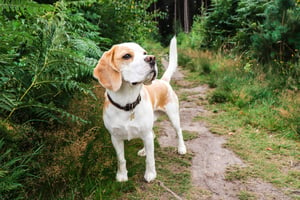Training a bulldog puppy can be an incredibly rewarding experience. Not only will you be helping...
12 Week Puppy Training Guide: A Comprehensive Guide
Training your puppy can be a daunting task, but with the right tools and techniques, you can have a well-behaved pup in no time. This guide will walk you through the basics of 12-week puppy training, from housebreaking and socialisation to obedience and beyond. By the end of the 12 weeks, you will have a pup that is happy, healthy, and well-behaved.
Get Your Puppy Ready for Training
Before you begin the 12-week puppy training program, there are a few things you need to do to make sure your pup is ready:
- Get your puppy vaccinated. Vaccines are an important part of keeping your pup healthy, so make sure they are up to date before beginning your training program.
- Establish a potty routine. Establishing a potty routine is an important part of housebreaking your pup. Have them go to the same spot every time they need to go and reward them for doing so.
- Set up a safe space. Make sure your pup has a safe and comfortable place to rest and relax. This will help them feel secure and make the training process easier.
Once you have taken care of these basics, you are ready to start your 12-week puppy training program.
Week 1: Socialisation and Familiarisation
The first week of your 12-week puppy training program should be dedicated to getting your pup used to their new home and people. This is an important step in the training process, as it will help your pup become comfortable and confident in their new environment.
Start by introducing your pup to their new home and family members. Make sure to give them plenty of love and attention and make sure they are comfortable. Once they are settled in, you can start introducing them to new people, animals, and environments. Take them for walks, to the park, and to the pet store. These experiences will help your pup become accustomed to new sights, smells, and sounds.
At the end of the week, your pup should be comfortable and confident in their new home and environment.
Week 2: Establishing Basic Commands
Now that your pup is comfortable in their new environment, it is time to start teaching them basic commands. This is an important part of 12-week puppy training, as it will help your pup understand what is expected of them and make the training process easier.
Start by teaching them the basics, such as sit, stay, down, and come. Use treats and praise to reward your pup for following commands. Once they have mastered the basics, you can move on to more advanced commands, such as fetch, roll over, and shake.
It is important to be consistent with your training. Make sure to practice the commands every day and reward your pup for following them.
Week 3: Crate Training
Crate training is an important part of 12-week puppy training, as it will help your pup understand boundaries and make housebreaking easier. Make sure to introduce your pup to the crate slowly and reward them for going in. Once they are comfortable, you can start to leave them in the crate for short periods of time.
Make sure to give your pup plenty of exercise before and after crate time. This will help them stay calm and comfortable while in the crate and make the training process easier.
Week 4: Leash Training
Once your pup is comfortable in the crate, it is time to start leash training. This will help your pup understand boundaries and help you keep them safe when out and about.
Start by introducing your pup to the leash and collar. Make sure to reward them for being calm and relaxed. Once they are comfortable, you can start to take them on short walks. Make sure to keep the walks short and reward your pup for following the commands. As they become more comfortable, you can increase the length of the walks.
Week 5: Housebreaking
Housebreaking is an important part of 12-week puppy training, as it will help your pup understand boundaries and make them easier to manage. Start by establishing a potty routine. Make sure to take your pup to the same spot every time they need to go and reward them for doing so.
When your pup has an accident, make sure to stay calm and be consistent with the potty routine. Avoid punishing your pup, as this can make the process more difficult. Instead, use positive reinforcement and rewards to reinforce the desired behaviour.
Week 6: Chewing and Nipping
Chewing and nipping are natural behaviours for puppies, but they can be dangerous and destructive. To help your pup learn to control these behaviours, make sure to provide them with plenty of chew toys and reward them for using them. When your pup does chew or nip on something they shouldn't, make sure to redirect them to an appropriate chew toy and reward them for using it.
It is also important to establish boundaries. Make sure to set limits on what your pup is allowed to chew or nip on and reward them for following the rules.
Week 7: Socialisation and Leash Manners
Now that your pup is comfortable with basic commands and housebreaking, it is time to start working on socialisation and leash manners. This will help your pup become comfortable in new environments and people.
Start by introducing your pup to new people, animals, and environments. Make sure to reward them for being calm and relaxed. When out and about, make sure to keep your pup on a leash and reward them for following commands. This will help them understand boundaries and make them easier to manage.
Week 8: Advanced Training
Once your pup is comfortable with basic commands and socialisation, it is time to start working on advanced training. This will help your pup become even more well-behaved and obedient.
Start by teaching your pup more advanced commands, such as fetch, roll over, and shake. You can also start teaching them tricks, such as playing dead or speaking. Make sure to reward your pup for following commands and be patient with them as they learn.
Week 9: Practice, Practice, Practice
Now that your pup has mastered the basics and advanced commands, it is time to start practicing. This is an important step in the 12-week puppy training program, as it will help your pup become more consistent with their commands.
Make sure to practice the commands every day and reward your pup for following them. This will help them understand what is expected of them and make them more obedient.
Week 10: Establish Boundaries
Now that your pup is comfortable with commands and socialisation, it is time to start establishing boundaries. This will help your pup understand what is expected of them and make them easier to manage.
Start by setting limits on what your pup is allowed to chew or nip on and reward them for following the rules. Make sure to be consistent with the boundaries and reward your pup for following them.
Week 11: Troubleshooting
Now that your pup has mastered the basics and advanced commands, it is time to start troubleshooting any issues that may arise. This will help you identify and address any problems quickly and effectively.
Start by observing your pup's behaviour and keeping track of any issues that arise. If your pup is having trouble with a particular command, make sure to practice it more and reward them for following it. If your pup is having behavioural issues, make sure to address them quickly and consistently.
Week 12: Maintenance
By the end of the 12-week puppy training program, your pup should be well-behaved and obedient. However, it is important to maintain their training to ensure they stay that way. Make sure to practice the commands every day and reward your pup for following them.
It is also important to continue to socialise your pup and introduce them to new people and environments. This will help them stay confident and comfortable in new situations.
Conclusion
12-week puppy training is an important part of raising a happy, healthy, and well-behaved pup. With the right tools and techniques, you can have a pup that is obedient and confident in no time. Make sure to take your time and be consistent with the training. With dedication and patience, you will have a pup that is a joy to be around.



